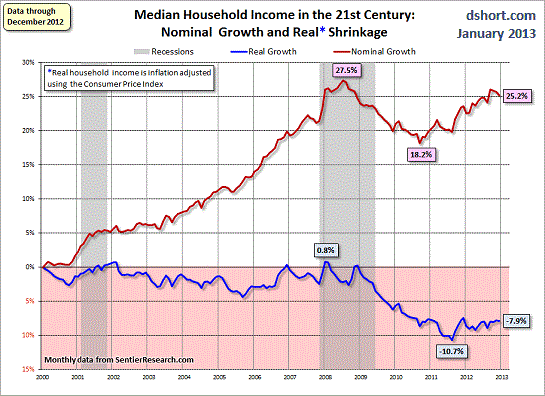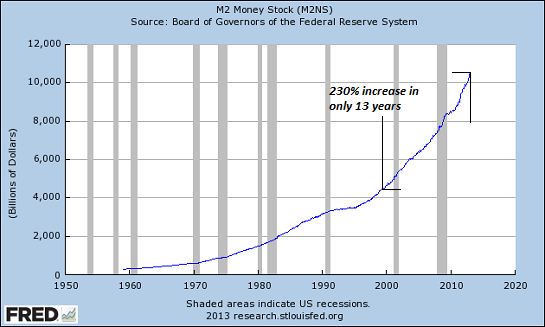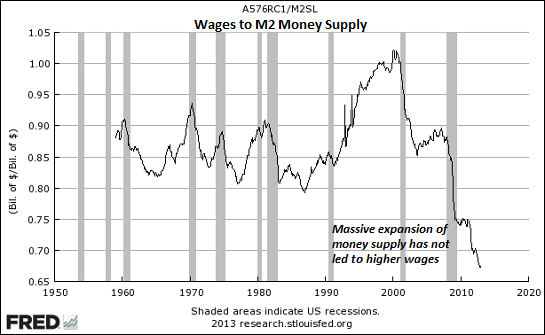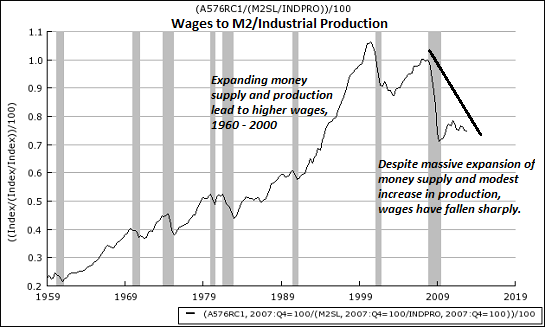Understanding Failed Policies: Wealth Effect, Wage Effect, Poverty Effect
Central banks' attempts to boost borrowing, consumption and wages by inflating asset bubbles leads to the poverty effect, not the wealth effect.
Central bankers have been counting on "the wealth effect" to lift their economies out of the post-2009 global meltdown slump. The wealth effect concept is simple: flooding the economy with credit and zero-interest money boosts the value of assets such as housing, stocks and bonds. Those owning the assets feel wealthier, and thus more inclined to borrow and spend more money. This new spending creates more demand which then leads employers to hire more employees.

Apologists will claim that it would even be worse without central banks attempting to inflate asset bubbles in search of the wealth effect, but the wage/M2 money supply correlation suggest chasing the wealth effect has been a policy failure.




I tend to think of "inflation" as the effect on the purchasing power of wages from the differential rate of change of money supply (and by extension bank lending and GDP) to wages (relied upon virtually exclusively by 90% of households, including those receiving transfers from taxes on wages) with regard to production.In other words, if wages are rising along with production and prices, price inflation is largely a reflection of population, value-added output and consumption, and commensurate returns to labor from growth of money and production, i.e. an optimal growth condition.
However, if growth of money (M2) and bank lending (and GDP, which rises as a result of gov't deficit spending), exceeds growth of wages and production, money inflation tends to result in price inflation that erodes the purchasing power of wages and private production. This reflects economic conditions that are sub-optimal or recessionary.
To the extent that there is a so-called "wealth effect," the flow effect is likely in the opposite direction as is commonly assumed; that is, rising production and wages to money supply affect an increase in asset prices; therefore, it should be referred to as the "wage effect" on growth of economic activity and asset prices, rather than the converse.
Thus, the S&P 500 dropping back to the level of the mid-'90s (when the bubble commenced) would reflect the "wage effect" and actual sub-par economic conditions rather than the dubious "wealth effect" assumed from rising asset prices.
Of course, in the hyper-financialized US economy and global imperial trade regime, this is heresy.
Things are falling apart--that is obvious. But why are they falling apart? The reasons are complex and global. Our economy and society have structural problems that cannot be solved by adding debt to debt. We are becoming poorer, not just from financial over-reach, but from fundamental forces that are not easy to identify or understand. We will cover the five core reasons why things are falling apart:
 1. Debt and financialization
1. Debt and financialization2. Crony capitalism and the elimination of accountability
3. Diminishing returns
4. Centralization
5. Technological, financial and demographic changes in our economy
Complex systems weakened by diminishing returns collapse under their own weight and are replaced by systems that are simpler, faster and affordable. If we cling to the old ways, our system will disintegrate. If we want sustainable prosperity rather than collapse, we must embrace a new model that is Decentralized, Adaptive, Transparent and Accountable (DATA).
We are not powerless. Not accepting responsibility and being powerless are two sides of the same coin: once we accept responsibility, we become powerful.
Kindle edition: $9.95 print edition: $24 on Amazon.com
To receive a 20% discount on the print edition: $19.20 (retail $24), follow the link, open a Createspace account and enter discount code SJRGPLAB. (This is the only way I can offer a discount.)
| Thank you, Helen S.C. ($10), for yet another magnificently generous contribution to this site -- I am greatly honored by your steadfast support and readership. | Thank you, Bud W. ($50), for your stupendously generous contribution to this site --I am greatly honored by your support and readership. |



























